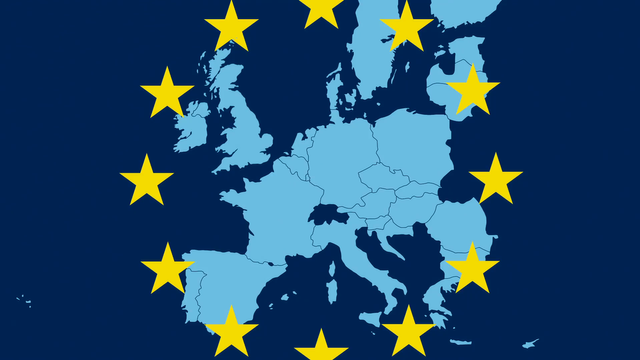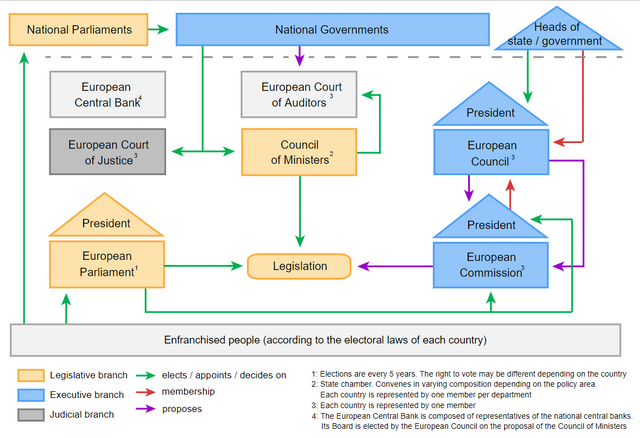How To Fix The Undemocratic European Union
When you listen to "Euroskeptics", talking about the European Union being "unelected", you might wonder how they imagine the EU representatives actually come to their positions. Are the positions hereditary? Well, I looked it up, and while it's not straight-up monarchy, it does have quite a few mechanisms that result in the people having little say in the European balance of power, and actually the 28 national governments being almost in full control. That means while Europe is luckily no longer a wartorn battleground, today it's an economic peaceful battleground between nations, or rather between governments, trying to get more wealth for their country, resulting in a few powerful countries dominating the rest.

There are 4 main institutions making decisions in the EU. There is the European Council, which is made up of all the heads of government of the 28 member states. Its main job is to nominate the European Commission and its Commission President with a 2/3 majority, which is the executive of the EU, the President and his Cabinet so to speak. Once nominated, the Commission enters office after they're approved by a majority of the European Parliament, which is elected directly by the people. Laws can only be proposed by the European Commission, and then in most cases have to be approved by both the Parliament and the Council of Ministers, which is made up of 1 minister per member state. Depending on the topic of the new law, different ministers meet, for example for a law on agriculture, the ministers responsible for agriculture meet. Here's a visual summary:
If you still can't see how this structure is undemocratic, let me show you how it would look like if the US was run this way: The 50 governors get in a room together and decide who they want to nominate for President, then the House of Representatives gets to decide whether they accept that person or not, they do the same with the Cabinet, proposed by the governors and approved by the House. Then only legislation that the President wants even gets proposed, which is then voted on by the 50 state secretaries of for example agriculture, as well as the House in order to become law. That's just crazy, almost every part of it is specifically designed to ensure power lies not with the people but with state governments, trying to dominate other state governments. That would lead to a United States where California can force Oregon to vote for its Cabinet picks, using California's economic power; and there's little to nothing the House of Representatives, which is then the only direct representation the people have, can do about it. Even if all people outside California hate what their government is doing to other state governments, as long as they're economically dominant they can effectively force them to do what they want.
To see this system in action, let's look at how Europe dealt with the Great Recession in 2008. Did they do what the US did and use federal economic programs including the trillion dollar bailout to stabilize the economy in the entire Union? Well, not exactly. No, instead they basically just waited until some member states were on the verge of bankruptcy, and only then did they start with bailouts. That is because member state governments are in control of basically everything, and even though years later, in 2015, the EU started quantitative easing to stabilize the economy, back when the crisis actually hit not much was done for months and years.
None of the leaders from the richer countries, like Germany or France, wanted to look like they're "giving away our money to foreigners" in the next election, so they just let it happen. When push came to shove and Greece was on the verge of collapse, they forced them to do austerity, cut spending. That may sound innocent enough, but anyone who has taken economics 101 can tell you that taking away stimulus during a recession is basically suicide. Or in this case rather waterboarding, because whenever Greece was on the verge of bankruptcy again after that, they got a bailout from the rich countries again, to just keep their government from collapsing and the Eurozone with it, but not enough to actually recover their economy.
And so far Greece's economy has shrunk to 54% of what it was in 2008, their unemployment went from 7% in 2008 to 27% in 2013 to 20% now. This entire crisis was a debt crisis, it was about the fear that Greece may not be able to pay off its debt because its already high debt meant nobody would lend them money except with an enormous interest rate, 25% at the peak. And while at the height of the crisis Greece was 370 billion € in debt, at the end of it the European bailouts amounted to a total of 310€, over about 7 years. So if they had just given them that money from the beginning, we could have avoided this whole thing and probably Germany would have even saved money. While the cuts in spending in Greece's case were maybe not entirely justified in principle because they were really quite high for such a poor country, doing them without simaltaneous cuts in taxes for the Greek people is predictably disastreous.
Anyway. The way I see it, there is a long-term solution to this: We need mechanisms in Europe that automatically help countries who experience for example high unemployment, that make sure poor countries can't just drive up debt to pay for fantastically high pensions, and that also don't result in poor countries becoming poorer and poorer because of the free European market and common currencies, both of which create a trade deficit for poorer countries which make them poorer. So, what's the solution?
Well, I imagine a common unemployment insurance within the Eurozone, that all its citizens pay in just like they do with their national insurance today, with people getting a certain percentage of what they paid in, only having a common European insurance means we automatically take a burden off of the shoulders of struggling countries. The same goes for a common pension fund: Greece's government can't lure voters with the promise of a gigantic debt-financed pension, but at the same time the Greek citizens are taxed substantially less on average because they're poorer on average, just like poor people within today's national pension funds are taxed a smaller amount than rich people. And then also common funds for healthcare, which citizens of the Eurozone pay in individually and which is then paid to the national governments for them to spend as they see fit, since there are many different healthcare systems in Europe today. All of those programs would be overseen by a directly elected Eurozone parliament, which also controls the European Central Bank, then.
So, what do you think about this assessment of the problems with the European Union, and my solution? That idea is a combination of multiple ideas I have heard a few times and a few ideas of my own, for example French President Emmanuel Macron also wants a Eurozone parliament to oversee a budget of hundreds of billions of Euros, only he wants it for economic investments. But I think it would work, and if you sell it right, maybe a majority in the Eurozone would actually support it. I mean Macron got elected on a vision of more European Unity, maybe if a German gets elected on the same platform that would actually be doable. Right now, the German left-of-center coalition (Red-Red-Green) gets a total of 44% in polls, 48% would be needed for a majority in the Bundestag.

I'm not too informed on Europe, but will do more research on this stuff myself in the near future. I'd like to know how all this works in a better way!
One major difference in the political systems is that most European countries elect their parliaments with proportional representation (exceptions mainly UK and France), meaning voters vote for a party nationally, and then each party gets the exact percentage of the vote they got in parliament, so a party with 23% of the vote gets 23% of the seats. That leads to far more competition among parties than in for example the US, for example in Germany where I live there are 6 parties in parliament now, with between 10% and 33% of the seats, "the lesser of two evils" is not really a thing here. This increased competition leads to much less hostility between parties, but another important factor in that is that almost all European countries (except mainly France) are parliamentary republics, meaning the majority in parliament elects the government. You can't alienate half the parliament if you want to form a coalition.
Anyway, you said you want to look more closely into how the EU is run, I can recommend you a few things for that if you like. I personally have learned a lot about the problems of the EU from former finance minister of Greece Yanis Varoufakis during its financial crisis and European bailout. I have to warn you though, he says of himself that he'd like communism if it was politically feasable, and obviously having been a politician himself he may or may not have a stake in portraying his actions in a positive light, but here's basically the main things he's talking about, in an interview with a German political journalist I like